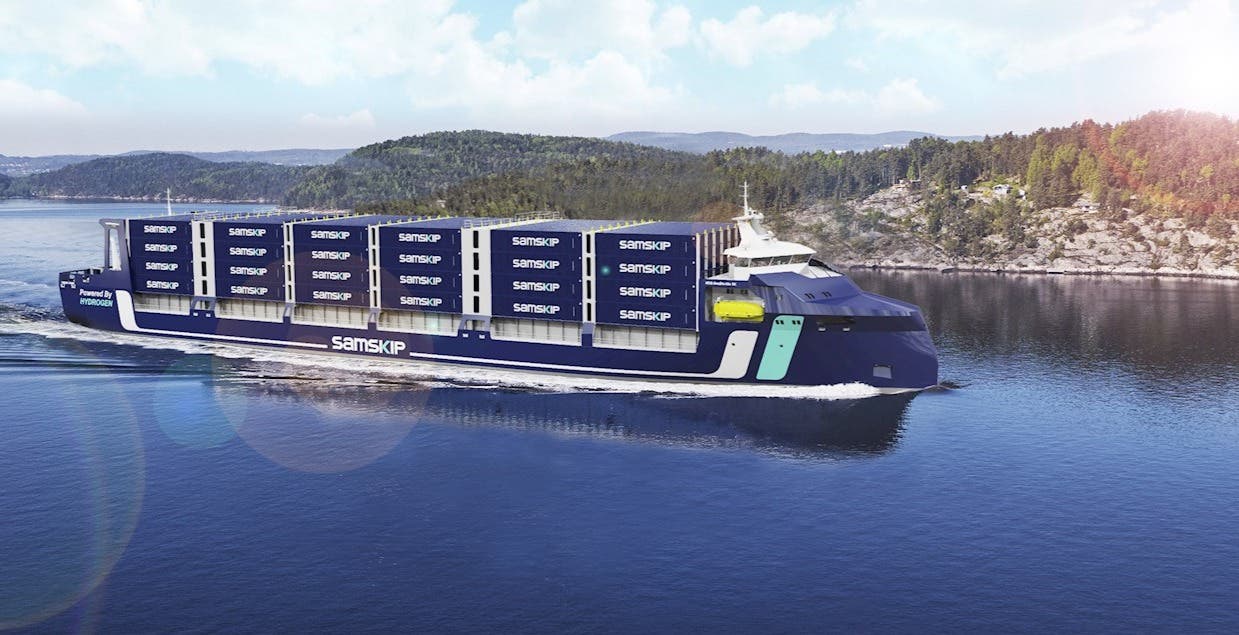First-ever hydrogen-powered cargo ship to revolutionize global shipping
ABB and Samskip introduce the world’s first ocean container ships powered by a hydrogen fuel cell distribution system

[Nov. 24, 2023: JD Shavit, The Brighter Side of News]
The collaboration between ABB, Samskip, and Cochin Shipyard exemplifies the potential of technology and international cooperation to create a cleaner, safer future. (CREDIT: ABB)
In the vast realm of international trade, where goods crisscross the globe through our planet's waters, the maritime industry has long been a significant contributor to carbon pollution.
However, a groundbreaking collaboration between engineering and technology firm ABB, Dutch shipping company Samskip, and India's Cochin Shipyard is poised to chart a new course towards sustainability. They are working together to introduce some of the world's first ocean container ships powered by a hydrogen fuel cell distribution system, marking a pivotal moment in maritime history.
"These ships are a milestone for the maritime industry," exclaimed Erik Hofmeester, the head of vessel management at Samskip, reflecting the optimism surrounding this initiative.
At the heart of this innovative endeavor is ABB's proprietary onboard grid and technology package, designed not only to optimize the usage of hydrogen energy but also to ensure safety in maritime operations. The initial phase of this ambitious project involves the construction of two vessels capable of traveling approximately 800 miles on a single hydrogen fuel cell charge.
Related Stories
Hydrogen fuel cell technology, which has been in conceptual existence since William Grove's visionary thoughts in 1842, truly began to see significant practical development in the 1950s. The first hydrogen fuel cell-powered car, produced by GM, was not introduced until 1966.
The appeal of hydrogen lies in its clean energy properties, as it generates only water as a byproduct when utilized. Each of the new vessels in the Samskip fleet is projected to make a remarkable impact by averting the release of roughly 25,000 tons of carbon dioxide annually. This translates to a pollution-saving equivalent that surpasses removing more than 5,000 passenger cars from the road in a single year.
In an era marked by climate change and the alarming consequences of carbon emissions, such initiatives offer hope for the planet and its inhabitants. According to NASA, human activities have elevated atmospheric carbon levels by 50% in less than two centuries, contributing to global warming and an increased risk of extreme events like wildfires.
HDF is very excited to cooperate with ABB to assemble and produce megawatt-scale fuel cell systems for the marine market based on Ballard technology. (CREDIT: ABB)
The collaboration between ABB, Samskip, and Cochin Shipyard exemplifies the potential of technology and international cooperation to create a cleaner, safer future without compromising the vital thread of international trade and human connectivity.
"AAB is at the forefront of shipping's most ambitious plans for decarbonization and setting new standards for green maritime transportation," emphasized Juha Koskela, the division president of ABB's Global Marine and Ports Business. Koskela also highlighted the cost-efficiency aspect, with operational expenses expected to decrease as a result of this revolutionary technology.
Juha Koskela, the division president of ABB's Global Marine and Ports Business. (CREDIT: ABB)
The International Maritime Organization, the regulatory agency governing global shipping, has committed to a formidable target: reducing pollution from international shipping by 2050, with a significant focus on increasing the usage of low-carbon fuels by 2030.
While the exact date of these groundbreaking ships' maiden voyage remains undisclosed, the order for their construction was placed during the second quarter of 2023, according to the Maritime Executive. This signifies a tangible step forward in realizing a cleaner, more sustainable future for international maritime trade, as well as a safer planet for all its inhabitants.
Note: Materials provided above by The Brighter Side of News. Content may be edited for style and length.
Like these kind of feel good stories? Get the Brighter Side of News' newsletter.
Joshua Shavit
Science & Technology Writer | AI and Robotics Reporter
Joshua Shavit is a Los Angeles-based science and technology writer with a passion for exploring the breakthroughs shaping the future. As a contributor to The Brighter Side of News, he focuses on positive and transformative advancements in AI, technology, physics, engineering, robotics and space science. Joshua is currently working towards a Bachelor of Science in Business Administration at the University of California, Berkeley. He combines his academic background with a talent for storytelling, making complex scientific discoveries engaging and accessible. His work highlights the innovators behind the ideas, bringing readers closer to the people driving progress.



